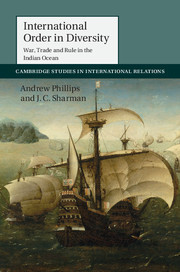Description
International Order in Diversity
War, Trade and Rule in the Indian Ocean
Cambridge Studies in International Relations Series
Authors: Phillips Andrew, Sharman J. C.
This book explains how a diverse Indian Ocean international system arose and endured during Europe's crucial opening stages of imperial expansion.
Language: English
Subject for International Order in Diversity:
Approximative price 95.70 €
In Print (Delivery period: 14 days).
Add to cart
International Order in Diversity
Publication date: 04-2015
274 p. · 15.2x22.9 cm · Hardback
Publication date: 04-2015
274 p. · 15.2x22.9 cm · Hardback
Approximative price 30.20 €
In Print (Delivery period: 14 days).
Add to cart
International Order in Diversity
Publication date: 04-2015
271 p. · 15.1x22.8 cm · Paperback
Publication date: 04-2015
271 p. · 15.1x22.8 cm · Paperback
Description
/li>Contents
/li>Biography
/li>
International relations scholars typically expect political communities to resemble one another the more they are exposed to pressures of war, economic competition and the spread of hegemonic legitimacy standards. However, historically it is heterogeneity, not homogeneity, that has most often defined international systems. Examining the Indian Ocean region - the centre of early modern globalization - Andrew Phillips and J. C. Sharman explain how diverse international systems can emerge and endure. Divergent preferences for terrestrial versus maritime conquest, congruent traditions of heteronomy and shared strategies of localization were factors which enabled diverse actors including the Portuguese Estado da India, Dutch and English company sovereigns and mighty Asian empires to co-exist for centuries without converging on a common institutional form. Debunking the presumed relationship between interaction and homogenization, this book radically revises conventional thinking on the evolution of international systems, while deepening our understanding of a historically crucial but critically understudied world region.
Introduction; 1. The puzzle of durable diversity in international relations; 2. The initial growth of diversity, 1500–1600; 3. The expansion of diversity and competition under heteronomy, 1600–50; 4. The stabilization of diversity, 1600–1750; 5. Reconfiguring diversity in the age of empire, 1750–1900; Conclusion: order in diversity.
Andrew Phillips is an Australian Research Council Discovery Early Career Research Award Fellow and Senior Lecturer in International Relations and Strategy in the School of Political Science and International Studies at the University of Queensland.
J. C. Sharman is a Professor in the Centre for Governance and Public Policy at Griffith University.
J. C. Sharman is a Professor in the Centre for Governance and Public Policy at Griffith University.
© 2024 LAVOISIER S.A.S.




